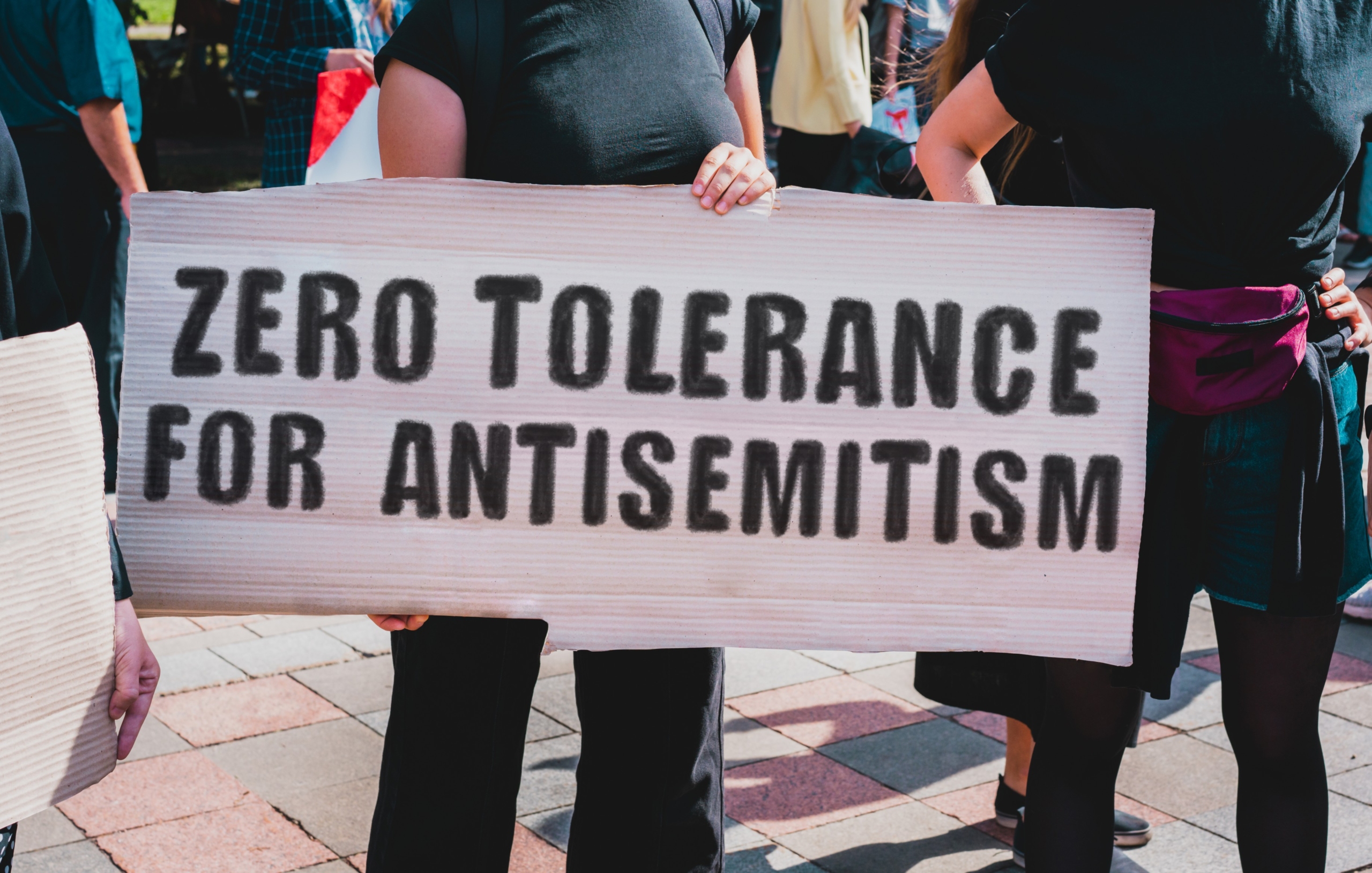On Monday, people across the globe will remember the first anniversary of the worst massacre of Jews since the Holocaust. Except, in practice, it’s going to be a bit more complicated than that.
For some, especially on the left and across university campuses, the natural instinct to express solidarity with the victims of aggression will be more muted in this case. There may be a sense that the victims of terror are less deserving of solidarity because of how Israel then responded to the terrorist attacks. Or maybe the victims did not merit more than a passing expression of sympathy in the first place, because the prior actions of Israel diminished the responsibility of the terrorists, while increasing that of their victims (or at least of their elected government).
Meanwhile, many Jews will be approaching October 7th this year with foreboding. They will be remembering – how can they ever forget? – the innocent men, women and children who were murdered in cold blood at the Supernova music festival and in the nearby kibbutzim. And they will be praying for the hostages who remain, held kidnap underground, in tunnels in Gaza.
But generally they will do so privately, in the intimacy of their families and close friendship groups, because they have seen what happens when Jews express these feelings publicly. Friendships can be lost, one’s professional career can be damaged, and that is even before you get to the vile antisemitic abuse that will come their way on social media from people they have never met and never sought to harm.
It is to both these groups of people that I am writing in this post. To my fellow non-Jewish progressives, I want to explain why I think a lack of solidarity with the Jewish people at this time is morally and intellectually indefensible. And to Jews here in Britain and overseas I want to offer, in a small way, something that progressives are normally very keen to demonstrate to the victims of aggression, micro or otherwise: allyship.
Having been active in the Labour Party for thirty years, this is personal to me because I have seen this movie too many times before. As an undergraduate when the Oslo peace process collapsed and the second intifada began, I saw Jewish students abused for the actions of the Israeli government. As a special adviser in the last Labour government, I saw officials slip into a ‘both sides-ism’, in which terrorist groups and democratic states operating under the rule of law are each urged equally to exercise ‘restraint’. (To their great credit, both Tony Blair and my old boss Gordon Brown stood firm as friends of the Jewish people.) And when the Corbynistas took over my party, I heard newly arrived Labour party members explain away some of the most vicious antisemitic tropes, while hounding out Jews who tried to object.
But the experience today feels even worse because the moral choice ought to be so clear cut. On October 7th 2023, over 1,100 innocent Israeli men, women and children were murdered and 250 were taken hostage by Hamas terrorists. The victims were not enemy combatants who were killed in war. Nor were they civilians accidentally killed in an attack on a legitimate military target. These were civilians who were deliberately targeted by terrorists aiming to kill as many Jews as possible. That is what made the attacks so unspeakably evil.
It should not be surprising that in the days and weeks following the attacks there were protests and demonstrations across the democratic world, particularly in our universities. But these demonstrations were not against the perpetrators of the atrocities. They were against the country that had a clear right under international law to defend its citizens from such atrocities.
As Jewish students dealt with the psychological trauma of a pogrom carried out against young men and women just like them, and as anti-Semitic incidents rose dramatically in the United States and the United Kingdom, they might have expected that a degree of sensitivity would be displayed towards them by their academic institutions and organised student groups.
After all, no matter how strongly some activists might have felt about the Israeli-Palestinian conflict, there was a recent precedent on campus for how student bodies would handle the tension between freedom of speech and the welfare of those who could be offended or endangered by that speech.
In the previous two years, a number of universities and student unions had held speaking events or debates on issues relating to trans rights. These pitted the rights of trans women against the free speech of those who espoused gender critical theory i.e. who argued that biological sex is distinct from gender, and that biological women have a right to certain spaces such as lavatories and changing rooms being prohibited from use by those who are anatomically male, even if they present and live as women.
Here the progressive response was clear. The free speech of gender critical theorists had to take second place to the rights of trans students who might be upset and threatened by it in a place, their university, in which they might reasonably be expected to feel safe. Invitations to supporters of gender critical theory such as Kathleen Stock were cancelled or their events disrupted by student activists who were determined to protect their trans peers.
But when it was Jewish students who were concerned about campus protests threatening their safety, the same progressives were no longer so keen on allyship. When Jews complained of rising antisemitism on campus, the erstwhile allies of those facing injustice no longer seemed to be around. It felt, as David Baddiel has said, that ‘Jews don’t count’ as a proper minority.
Why would people who are normally so attentive to the feelings of minority groups suddenly become much more relaxed when it comes to concerns expressed by Jews? Could it be because it involved Jews? Could it be a case of antisemitism?
In response, two arguments are often made. First, the progressives in each case vigorously dispute the charge of antisemitism. They argue that we must distinguish between criticism of Israel (which they proudly admit) and criticism of Jews (which they strongly deny). Second, they argue that insofar as there may be a connection between criticism of Israel and antisemitism, it is grotesque behaviour by the State of Israel that acts as the root cause, or at least an exacerbator, of prejudice against Jews.
However, I do not think that either of these arguments stands up.
Yes, it is true that one can draw a meaningful distinction between criticism of Israel as a state and criticism of Jews as Jews. Indeed, you will find Jews criticising the current Israeli government and its policies all the time. But when the criticism of Israel extends not just to its policies but to its very existence, and when it is pressed with a frequency and a force that is not applied to any other country in the world, from Iran to Saudi Arabia to Russia, Jews are entitled to wonder whether something else might be going on here.
And if the anger was only about Israel, one would have expected it to have been directed at the Israeli embassy, not at synagogues and other Jewish community institutions with no connection to the Israeli state. Yet the Community Security Trust found that the first half of 2024 saw the highest number of antisemitic incidents ever reported, with an increase of over 100 per cent compared with the number of incidents reported in the same period last year.
Furthermore, when progressives confidently pronounce on what does and does not count as antisemitic, they assert a right that they would not dream of demanding in respect of other minority groups.
As Jonathan Freedland has written in the past:
On the left, black people are usually allowed to define what’s racism; women can define sexism; Muslims are trusted to define Islamophobia. But when Jews call out something as antisemitic, leftist non-Jews feel curiously entitled to tell Jews they’re wrong, that they are exaggerating or lying or using it as a decoy tactic – and to then treat them to a long lecture on what anti-Jewish racism really is.
The left would call it misogynist “mansplaining” if a man talked that way to a woman. They’d be mortified if they were caught doing that to LGBT people or Muslims. But to Jews, they feel no such restraint.
So this is my plea to the left. Treat us the same way you’d treat any other minority. No better and no worse. If opposition to racism means anything, it surely means that.
And what about the ‘root cause’ argument, that the behaviour of Israel is itself a recruiting sergeant for antisemitism?
Again, this violates a principle that the left would generally hold dear, the abhorrence of victim-blaming. As Eve Garrard wrote:
Think of those people who regard immigration as the root cause of all social unrest in the UK, or who think that women’s immodest dress and behaviour is the root cause of rape. Their prior hostility to what they identify as root causes is often remarkably clear.
If anyone tried to tell the average Labour party member that rape victims should have dressed differently, they would rightly be told where to go. To shift the blame for terrorist attacks away from those who committed them is similarly morally bereft.
Beyond all this, a third argument is occasionally made, particularly over the past year. There will be those who say, “I accept everything you’ve said so far. The moral responsibility for terrorist attacks sits with the terrorists themselves. And Jews are right that sometimes legitimate criticism of Israel strays into anti-Semitism. But” – this argument goes – “Israel hasn’t helped itself with the response to October 7th. If it behaved more reasonably, not all of the hatred would go, but some of it would dissipate.”
But this is also wrong-headed.
I wish it could be said that without the war, or with different Israeli political leadership, that there would be less antisemitism but I do not think there is any evidence for this.
For a start, there is the very obvious fact that the attacks of October 7th 2023 took place before, rather than during, the current Gaza war. The same is true of the spike in antisemitism in Britain under Jeremy Corbyn’s Labour leadership. And though Netanyahu has hardly strained every sinew to reach a peace agreement with the Palestinians, Ehud Barak certainly did – and it did not stop Yasir Arafat from saying no and from launching the second intifada.
This is perhaps most telling when we examine the most recent developments in Lebanon. For years, Hezbollah has been firing rockets into Israel from its base in southern Lebanon. This is not because of any ‘occupation’. Israel has not occupied southern Lebanon since 2000. Indeed, there is only one party clearly breaching UN resolutions by occupying southern Lebanon, and that is Hezbollah.
Since October 7th last year the intensity of Hezbollah’s attacks has increased to the extent that 67,500 Israelis have had to be evacuated from the towns and villages near its northern border. A year on, they remain away from their homes.
To get a sense of the significance of this, in a country of only 9 million people, it is as if the United States was facing daily rocket fire from Mexico and as a result had to evacuate the entire population of San Antonio and all the other towns and cities in southern Texas.
Can anyone imagine that, in such a scenario, the response of the United States would stop short of full-scale war? Or that the United States would be prepared to stop before it was confident it had eradicated the threat to its citizens and enabled them to return to their homes? Of course not.
It might be harder to imagine such a situation for an island nation such as ours in Britain, but it was not all that long ago that we faced bombs falling on our cities, and how did we respond?
In his book, Just and Unjust Wars, Michael Walzer analysed the records of UK Cabinet decisions during the Second World War. Initially, in 1940, a directive set out that British bombing targets in Germany had to be identified and aimed at. Indiscriminate bombing was forbidden. But then that changed, and the bombers were to aim for built-up areas in the centre of cities and the purpose of the raids was explicitly declared to be the destruction of civilian morale.
How does Israel compare with the British approach? It has faced criticism for its air and ground operations in Gaza because these led to civilian casualties, though it argues that its aim was to degrade Hamas’ military capabilities and that it provided advance warning to civilians and sought to create safe havens.
Yet it has also been criticised for its operations which have been targeted directly at Hezbollah operatives and leaders, such as the audacious coordinated attack on the pagers of Hezbollah operatives and the strike which killed the Hezbollah leader Hassan Nasrallah. If such extraordinarily targeted actions are criticised as unacceptable, in the face of a terrorist threat that has led to the mass evacuation of part of your population, it is hard to avoid the conclusion that for some people there is no action Israel could take to protect its citizens that would be regarded with approval. And that is what gets Jews worried.
I desperately hope there will be peace. And if I was living in Israel I would have joined protests against Netanyahu, against his judicial reforms and against the expansion of the settlements. I also think there should continue to be a vigorous debate over the conduct of the war. Indeed, it is one of the great benefits of Israel’s democracy, its rule of law and its free media that these debates can happen, with all the passion that one would expect from Israelis.
I hope you will take part in these debates too. But please think twice before doing it today, of all days.
Do you remember after the killing of George Floyd and the start of the Black Lives Matter movement, another movement began, calling itself All Lives Matter? Theoretically it was inclusive – surely we should care about all lives and not just black ones? – but in reality it was both pointless and offensive.
It was pointless because nobody in the BLM movement was for a moment suggesting that other lives did not matter. They wanted the rest of society to take a moment to reflect on the fact that George Floyd’s death suggested that, for some people in positions of power, black lives did not seem to matter as much as those of white people.
And it was offensive because, seen in that context, #alllivesmatter felt to black people like an attempt to diminish and delegitimise that message at a moment in time when it felt so profoundly important to them.
So let’s take today and this terrible anniversary to remember that Jewish lives matter. Jews do count. And let’s stand up and be counted with them.



4 Comments
Leslie Kaye
Thank you!
Ps It is no longer stated by anyone that a war was started in 1948 by the nations surrounding the newly created State of Israel and to this day only Jordan and Egypt have signed a peace treaty with Israel.
Mark Wagner
Thank you
Andrew Garfield
Thank you Stuart – your words mean a great deal
Trixxy Just
Stuart,
This is a really well written article, the sentiments of which I could not agree more with. However. please don’t refer to trans women as “anatomically male”. It shows a lack of understanding of the changes we put our bodies through, isn’t factually accurate, and plays to the transphobic dog-whistle that we’re just men dressing up as women.
You’ve always been supportive of our community, so I say this with love rather than anger!
Trixxy
Comments are Closed.